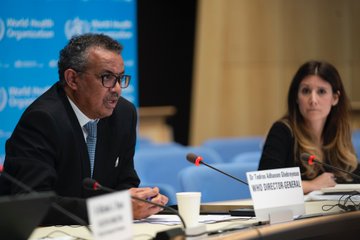The WHO is not our nanny!
KATHMANDU: Expecting WHO to be our universal nanny is unrealistic and dangerous, especially in the time of crisis. WHO is a body that brings together global expertise, health intelligence and experience to all its member states. Every organisation essentially represents the nature of its membership and what its members want it to be. WHO is made by your governments. Countries must take WHO's guidance as their core 'plan minimum' and add to it their wisdom.
Gripped by COVID19, all eyes are on WHO for guidance on what to do and what not to do? All it takes is to imagine our response to the pandemic in the absence of the WHO. All said and done common perception is that this is an organisation owned by member states and would be closest that we could get to neutral information. Many criticise WHO for being influenced by one powerful state or another. However, no one has come up with an alternative body that would enjoy the reach or brand recognition of WHO while maintaining the entire range of health expertise from epidemics to road injuries. Governments quote the WHO, follow its guidance and feedback data into it. The network of collaborative centres that the WHO operates in partnerships with academia and government are an immense asset to the global pool of knowledge and capacity.
What started as a health crisis has very rapidly evolved into a societal crisis. Some countries have declared COVID19 as a national security crisis, some have termed it a national disaster and others have termed it a war. It is essential in this context to understand the role of the WHO, lower our expectations from it and shift specific tasks and responsibilities to other actors.
While the WHO teams around the globe churn out a range of information material on how to deal with COVID19, other actors need to take that information forward to their constituents. Take, for example, the WHO's social distancing guidelines. These ought to be taken up by organisations within countries, modified to the local context, translated into the local languages and amplified using channels that work best in that given context. Marinating in inaction, awaiting tailor-made guidance for every population segment for every country is a luxury we can not afford now. In the country context, line ministries need to step up their game and use their intelligence to customise the science coming out of the WHO and channel it to their captive audiences.
Spoon-feeding is not an option in times of crisis. Similar to the WHO, as Ministries of Health are overwhelmed in responding to the COVID19, line ministries should not self-paralyse for lack of vetting of each communication piece from their Ministry of Health counterparts. There is neither the time nor any human resources can be spared for this. In the process of multiplying and amplifying messages, there might be a mistake made here and there, but they can be corrected. The risk of doing nothing is way higher than making a few mistakes.
Every emergency coordination meeting that I have attended at a country, regional or headquarters level invariably ends with one default recommendation- we must coordinate better. Pick any emergency response evaluation, and once again, you will see the same outcome. While coordination during a crisis may hold some limited promise within sectors- e.g. UN country teams, International NGOs, government ministries, it rarely works between industries. It is no different from how things function or don't within a building of tenants or extended family- there will always be some who go solo, or only halfheartedly implement agreements. I have found this to be valid as emergencies draw out.
In a COVID19 global crisis, let us allow WHO to focus on giving the world its best technical intelligence and advise. Let us not put it under the expectation of global babysitting. It is the time to encourage all other ministries, organisations, industrial bodies and associations to study, digest and use the WHO's knowledge and advance it to their audiences as quickly as possible using their innate intelligence and experience.
Let us help the WHO focus on its core business of knowledge generation and dissemination. It is time for each one of us to step up to our duty of using WHO's output responsibly and pro-actively in beating the menace of COVID19.






